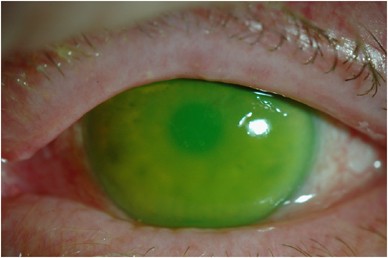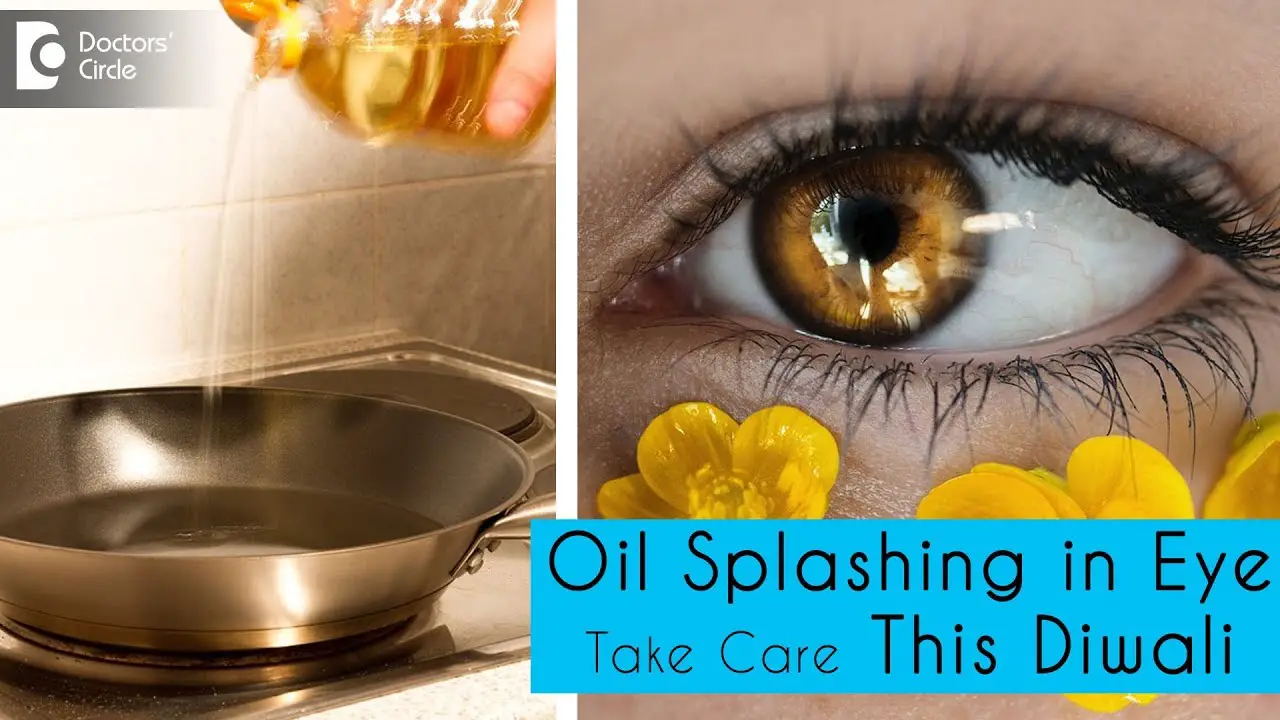If oil goes into the eyes, it can cause infections and other problems for the eyes, making it important to remove the oil promptly. Rinse the eyes with plenty of clean, lukewarm water and gently pat them dry to remove the oil and prevent any further complications.
Potential Consequences Of Oil In The Eyes
Getting oil in the eyes can potentially lead to infections and other issues. It is crucial to immediately rinse the eyes with plenty of clean, lukewarm water to remove the oil and prevent any further complications.
Damage to the Cornea:
- Potential injury to the cornea can occur when oil enters the eyes.
- The cornea is the clear tissue that covers the front of the eye and is essential for clear vision.
- Damage to the cornea can lead to long-term vision problems if not treated promptly.
Disruption of Vision:
- When oil enters the eyes, it can cause a disruption in vision.
- This can include blurred vision or difficulty focusing on objects.
- Oil on the surface of the eyes can affect the way light enters and refracts through the eye, resulting in impaired visual clarity.
Increase in Eye Sensitivity and Pain:
- Oil in the eyes can cause an increase in eye sensitivity and pain.
- The eyes may become more sensitive to light, leading to discomfort and the need to avoid bright environments.
- The presence of oil can also cause a stinging or burning sensation, making it uncomfortable to keep the eyes open.
Irritation and Redness:
- Eye irritation and redness are common consequences of oil entering the eyes.
- The oil can cause irritation to the delicate tissues of the eye, leading to redness and inflammation.
- This can result in itching and discomfort, making it challenging to keep the eyes open and focus properly.
Watery Eyes and Excessive Tearing:
- When oil enters the eyes, it can trigger the production of tears as a protective mechanism.
- This can result in watery eyes and excessive tearing.
- The tears produced may not be able to effectively wash away the oil, leading to prolonged discomfort.
Blurry Vision:
- One of the potential consequences of oil in the eyes is temporary or permanent blurred vision.
- The oil can affect the surface of the cornea, leading to a loss of clarity in vision.
- Blurry vision can make it challenging to see objects clearly and may require medical intervention to resolve.
Difficulty Focusing:
- Oil in the eyes can make it difficult to focus on objects.
- The presence of oil can disrupt the normal function of the eye muscles, affecting their ability to adjust the shape of the lens and focus properly.
- This can result in a decreased ability to see objects at various distances.
Impaired Visual Clarity:
- Impaired visual clarity is another potential consequence of oil in the eyes.
- The oil can create a film on the surface of the eyes, affecting the way light is transmitted through the eye and causing a decrease in visual acuity.
- This can make objects appear hazy or fuzzy, requiring medical treatment to restore clear vision.
Remember, it’s essential to seek medical attention if you get oil in your eyes to prevent further damage and ensure proper treatment.

Credit: www.nature.com
Steps To Take When Oil Gets Into The Eyes
If oil gets into the eyes, it can potentially cause infections and other problems, so it’s important to take action quickly. Rinse your eyes with plenty of clean, lukewarm water to remove the oil and gently pat them dry. Avoid using anti-redness drops to rinse your eyes.
:
- Flush the eyes with plenty of water: Immediately rinse the affected eye with clean water for at least 15 minutes. Position your head under a faucet or use a clean cup to pour water directly into the eye. This helps to flush out the oil and any particles that may be present.
- Avoid rubbing the eyes: It is crucial to resist the urge to rub the eyes as this can further irritate the affected area and potentially cause more damage.
- Remove any contact lenses if applicable: If you are wearing contact lenses, remove them carefully after flushing the eye with water. This ensures that the oil does not get trapped between the lens and the eye, which can exacerbate the irritation.
- Seek Medical Attention: Even though you may initially feel relief after flushing the eyes, it is important to seek medical attention to assess the severity of the injury and receive appropriate treatment.
- Consult an eye doctor or healthcare professional: Schedule an appointment with an eye doctor or visit an urgent care center to have your eyes examined. They will evaluate the extent of the damage and provide necessary treatment.
- Describe the incident and symptoms experienced: During the medical consultation, explain how the oil got into your eyes and any symptoms you experienced, such as pain, redness, blurry vision, or sensitivity to light. This information will help the healthcare professional determine the most suitable course of treatment.
- Follow their recommended treatment plan: Based on the examination, the eye doctor or healthcare professional will provide a treatment plan tailored to your specific situation. This may include the use of eye drops, ointments, or other medications to alleviate pain, reduce inflammation, and promote healing.
Prevention And Safety Measures:
- Wear protective eyewear when cooking or working with oil: To prevent oil from accidentally splashing into your eyes, wear safety goggles or glasses specifically designed for eye protection. These should provide a barrier between your eyes and the oil.
- Use a grease shield or lid on pans to prevent splashing: When cooking with oil, utilize a grease shield or lid to minimize the risk of oil splatters. These protective measures can help prevent oil from coming into contact with your eyes.
- Be cautious while applying hair products near the eyes: When using hair products such as oils, gels, or sprays, take care to apply them away from the eye area. This reduces the likelihood of accidental contact and potential eye irritation.
By following these preventive measures and knowing the correct steps to take in the event that oil gets into your eyes, you can minimize the risk of injury and protect your eyes from potential harm.
Specific Cases Of Oil In The Eyes
Getting oil in your eyes can be uncomfortable and potentially dangerous, as it can lead to infections and other issues. It is important to promptly rinse your eyes with plenty of clean water and gently pat them dry to remove the oil and prevent further complications.
Hot Cooking Oil
- Hot cooking oil can cause severe damage to the eyes if it splashes into them.
- The immediate action should be to flush the eye with plenty of water to remove the oil and any particles.
- Do not use anti-redness drops or any other ointments without consulting a healthcare professional.
- Seek medical attention if the irritation persists or if you experience severe pain, blurred vision, or any other concerning symptoms.
Hair Oil
- Accidentally getting hair oil in the eyes can cause mild pain and redness.
- Hair styling products, including hair oil, are generally minimally toxic when it comes to eye exposure.
- To relieve the irritation, rinse the eye with clean water for a few minutes.
- If the irritation persists or worsens, seek medical advice.
Castor Oil
- Castor oil is sometimes used on the eyelids and eyelashes for various purposes, such as promoting hair growth or treating blepharitis.
- When used correctly and in moderation, castor oil is considered safe for the eyes.
- It is important to follow proper application guidelines and avoid getting the oil directly into the eyes.
- If you experience any discomfort or adverse reactions after using castor oil on the eyelids, consult a healthcare professional.
Face Oil
- The use of face oil around the eyes requires caution and consideration.
- Some face oils may be irritating or cause allergic reactions when they come into contact with the delicate eye area.
- Before applying face oil near the eyes, perform a patch test on a small area of the skin to check for any adverse reactions.
- If you experience any discomfort, redness, or irritation after using face oil, discontinue the product and seek professional advice.
Remember, if you have any concerns about oil in your eyes or experience persistent symptoms, always consult a healthcare professional for proper evaluation and treatment.
Frequently Asked Questions On What Happens If Oil Goes Into Eyes
What To Do If Oil Goes Into Eyes?
If oil goes into your eyes, immediately flush them with plenty of water to remove the oil and any particles. Do not use anti-redness drops.
What Happens If Hair Oil Goes Into Eyes?
Getting hair oil in the eyes may cause mild pain and redness. Immediately flush the eyes with water to remove the oil and any particles.
Is It Safe To Put Oil On Your Eyes?
Putting oil on your eyes is not safe. It can cause infections and other problems. If oil gets in your eyes, rinse them with clean water immediately.
Can Oil In Eye Cause Blurry Vision?
If oil gets in your eyes, it can cause blurry vision and irritation. Flush your eyes with water to remove the oil.
How Can Hot Oil In The Eyes Be Dangerous?
Exposing your eyes to hot oil can potentially cause infections and other problems. It is important to remove the oil promptly and rinse your eyes with clean water.
Conclusion
Getting oil in your eyes can be a discomforting experience and potentially dangerous for your eye health. It can lead to infections and other problems if not addressed promptly. Therefore, it is important to know what to do if oil goes into your eyes.
The first step is to immediately flush your eyes with plenty of clean, lukewarm water. This will help remove the oil and any particles that may be present. Avoid using anti-redness drops or any other eye drops, as they may not effectively clean your eyes.
Remember, prevention is always better than cure. Use protective eyewear, such as glasses or a grease shield, when working with hot oil or grease to avoid splashes and accidents. Taking these precautions can significantly reduce the risk of oil getting into your eyes.
If you experience any persistent discomfort, redness, or blurry vision, it is crucial to seek medical attention from an eye specialist. They can assess the situation and provide appropriate treatment if needed. Being mindful of kitchen eye safety and knowing how to respond if oil goes into your eyes can help prevent potential eye damage and ensure the well-being of your eyes.
Stay safe and take care of your eyes.

